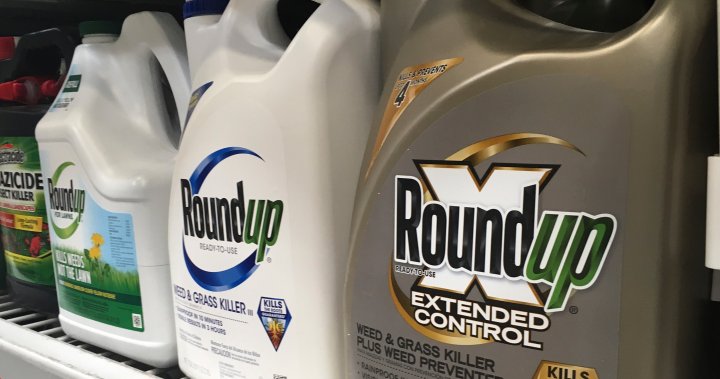
Why a Canadian class action lawsuit is taking aim at a common weedkiller
Global News
A Bayer spokesperson says that leading health regulators in Canada and around the world have repeatedly concluded that glyphosate is not a carcinogen.
A recently certified class action lawsuit is seeking at least $1.2 billion from multinational company Bayer on behalf of Canadians who claim to have been harmed while using Roundup weedkiller products.
The allegations have not yet been tested in court and Bayer says it stands behind the safety of the products.
Roundup, the brand name of a glyphosate-based herbicide that is the subject of the lawsuit, is the most commonly used herbicide in the world and has been sold across Canada since 1976 by U.S. company Monsanto. The German pharmaceutical giant Bayer acquired Monsanto in 2018.
About 165,000 claims have been filed in the U.S. against Bayer alleging Roundup caused users to get sick. The company says 113,000 of those claims have been resolved, meaning plaintiffs were financially compensated or the cases were deemed to be ineligible.
The Canadian case comes as the controversial ingredient glyphosate was taken out of household Roundup products in the U.S. this month.
“We took this action exclusively to help manage litigation risk in the U.S. and not because of any product safety concerns,” a Bayer email statement reads. “The vast majority of claims in the U.S. have come from residential lawn and garden users, so this action largely eliminates the primary source of future claims.”
In 2023, at least five U.S. plaintiffs won their Roundup-related court cases against Bayer – requiring the company to pay almost $2 billion in punitive damages and nearly $1 billion in compensatory damages. Several of these decisions are being appealed. Reuters reported that last month, Bayer won a trial against a related lawsuit, ending what had been a five-trial losing streak for the company in trials over similar claims.
Several Canadian challenges have also been launched over recent years, including a proposed class action from a Moose Jaw, Sask., farmer who alleged in 2019 that Roundup is linked to his diagnosis of non-Hodgkin’s lymphoma. Three proposed suits were filed in Ontario, Alberta and B.C. in 2019 as well, and advocates in New Brunswick and Quebec have been pushing over the last three years for bans on the weedkiller, citing safety concerns.











